Reflecting on Catholic Social Thought: UNCC100 Assessment 2 Analysis
VerifiedAdded on 2022/08/30
|6
|1711
|18
Essay
AI Summary
This essay, written for the UNCC100 course, reflects on the principles of Catholic Social Thought and their practical application in various communities. The student begins by defining and explaining their understanding of key principles such as human dignity, common good, solidarity, and subsidiarity. The essay then explores how these principles are evident in the student's virtual community, a non-profit organization focused on helping those in need, and discusses how the principles guide their actions. Furthermore, the essay extends the analysis to a future professional community, illustrating the relevance and impact of Catholic Social Thought in fostering a just and equitable society. The student emphasizes the importance of these principles for promoting peace, harmony, and social justice, highlighting how these principles can guide individuals and communities in contributing to the common good.
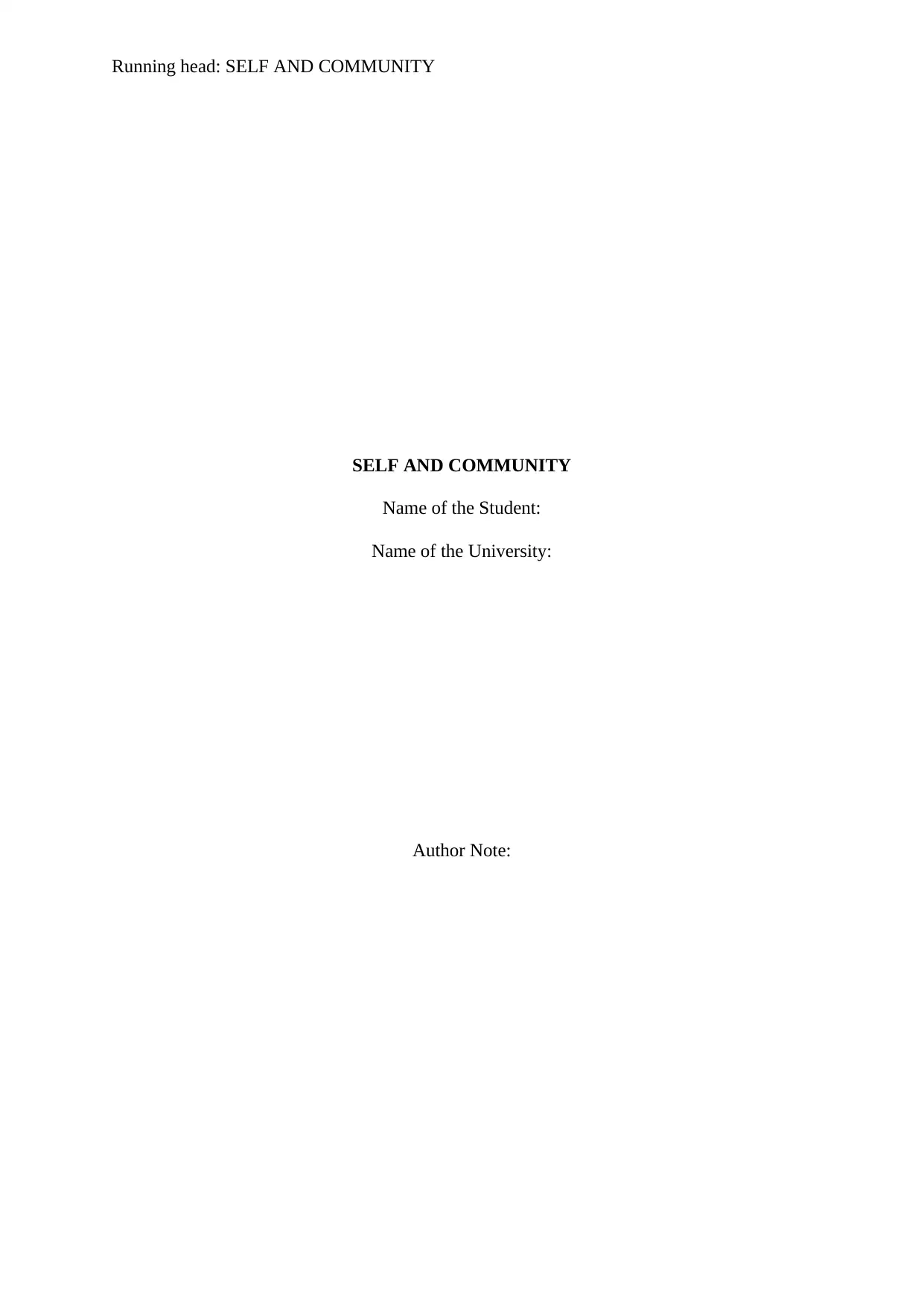
Running head: SELF AND COMMUNITY
SELF AND COMMUNITY
Name of the Student:
Name of the University:
Author Note:
SELF AND COMMUNITY
Name of the Student:
Name of the University:
Author Note:
Paraphrase This Document
Need a fresh take? Get an instant paraphrase of this document with our AI Paraphraser
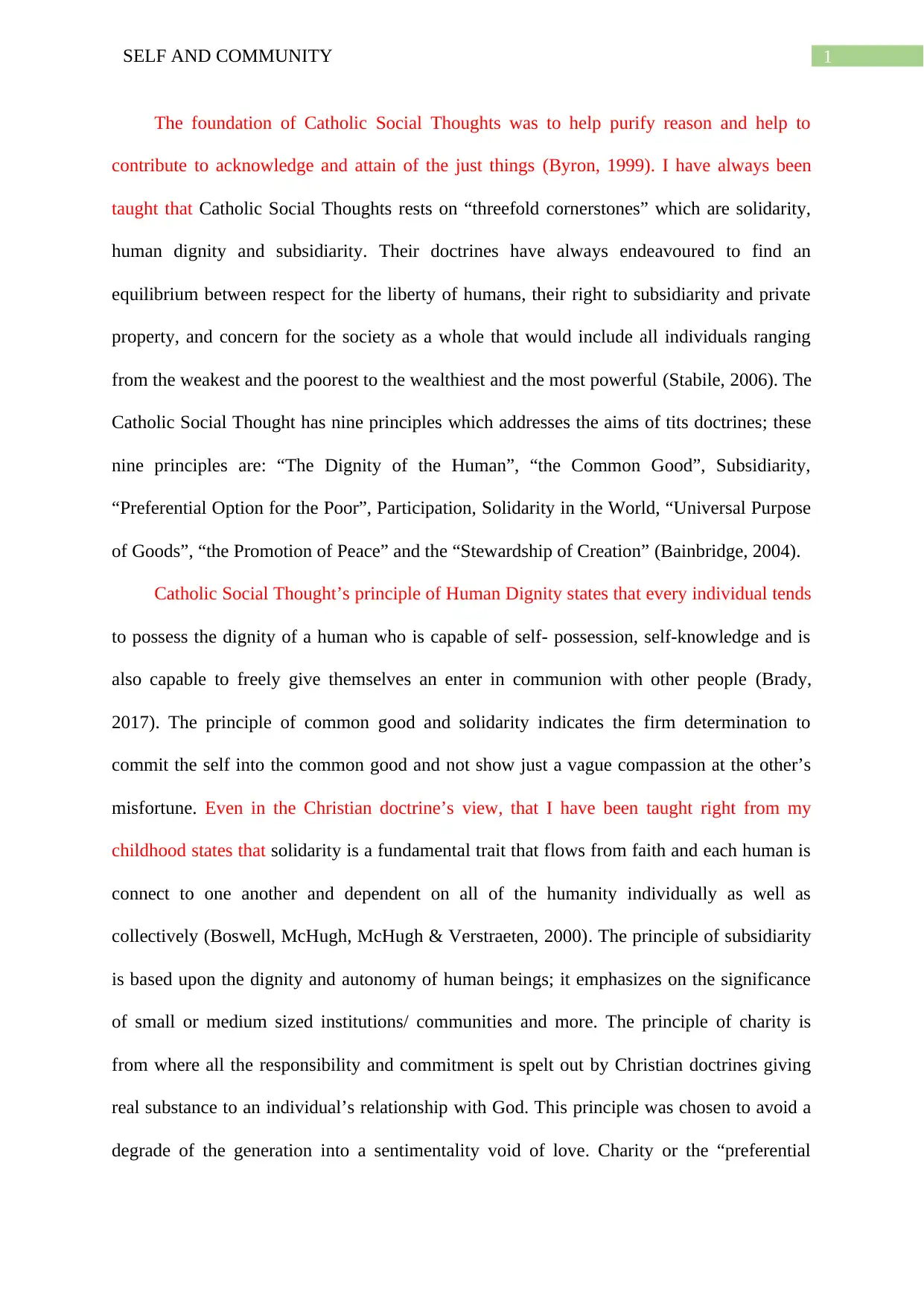
1SELF AND COMMUNITY
The foundation of Catholic Social Thoughts was to help purify reason and help to
contribute to acknowledge and attain of the just things (Byron, 1999). I have always been
taught that Catholic Social Thoughts rests on “threefold cornerstones” which are solidarity,
human dignity and subsidiarity. Their doctrines have always endeavoured to find an
equilibrium between respect for the liberty of humans, their right to subsidiarity and private
property, and concern for the society as a whole that would include all individuals ranging
from the weakest and the poorest to the wealthiest and the most powerful (Stabile, 2006). The
Catholic Social Thought has nine principles which addresses the aims of tits doctrines; these
nine principles are: “The Dignity of the Human”, “the Common Good”, Subsidiarity,
“Preferential Option for the Poor”, Participation, Solidarity in the World, “Universal Purpose
of Goods”, “the Promotion of Peace” and the “Stewardship of Creation” (Bainbridge, 2004).
Catholic Social Thought’s principle of Human Dignity states that every individual tends
to possess the dignity of a human who is capable of self- possession, self-knowledge and is
also capable to freely give themselves an enter in communion with other people (Brady,
2017). The principle of common good and solidarity indicates the firm determination to
commit the self into the common good and not show just a vague compassion at the other’s
misfortune. Even in the Christian doctrine’s view, that I have been taught right from my
childhood states that solidarity is a fundamental trait that flows from faith and each human is
connect to one another and dependent on all of the humanity individually as well as
collectively (Boswell, McHugh, McHugh & Verstraeten, 2000). The principle of subsidiarity
is based upon the dignity and autonomy of human beings; it emphasizes on the significance
of small or medium sized institutions/ communities and more. The principle of charity is
from where all the responsibility and commitment is spelt out by Christian doctrines giving
real substance to an individual’s relationship with God. This principle was chosen to avoid a
degrade of the generation into a sentimentality void of love. Charity or the “preferential
The foundation of Catholic Social Thoughts was to help purify reason and help to
contribute to acknowledge and attain of the just things (Byron, 1999). I have always been
taught that Catholic Social Thoughts rests on “threefold cornerstones” which are solidarity,
human dignity and subsidiarity. Their doctrines have always endeavoured to find an
equilibrium between respect for the liberty of humans, their right to subsidiarity and private
property, and concern for the society as a whole that would include all individuals ranging
from the weakest and the poorest to the wealthiest and the most powerful (Stabile, 2006). The
Catholic Social Thought has nine principles which addresses the aims of tits doctrines; these
nine principles are: “The Dignity of the Human”, “the Common Good”, Subsidiarity,
“Preferential Option for the Poor”, Participation, Solidarity in the World, “Universal Purpose
of Goods”, “the Promotion of Peace” and the “Stewardship of Creation” (Bainbridge, 2004).
Catholic Social Thought’s principle of Human Dignity states that every individual tends
to possess the dignity of a human who is capable of self- possession, self-knowledge and is
also capable to freely give themselves an enter in communion with other people (Brady,
2017). The principle of common good and solidarity indicates the firm determination to
commit the self into the common good and not show just a vague compassion at the other’s
misfortune. Even in the Christian doctrine’s view, that I have been taught right from my
childhood states that solidarity is a fundamental trait that flows from faith and each human is
connect to one another and dependent on all of the humanity individually as well as
collectively (Boswell, McHugh, McHugh & Verstraeten, 2000). The principle of subsidiarity
is based upon the dignity and autonomy of human beings; it emphasizes on the significance
of small or medium sized institutions/ communities and more. The principle of charity is
from where all the responsibility and commitment is spelt out by Christian doctrines giving
real substance to an individual’s relationship with God. This principle was chosen to avoid a
degrade of the generation into a sentimentality void of love. Charity or the “preferential
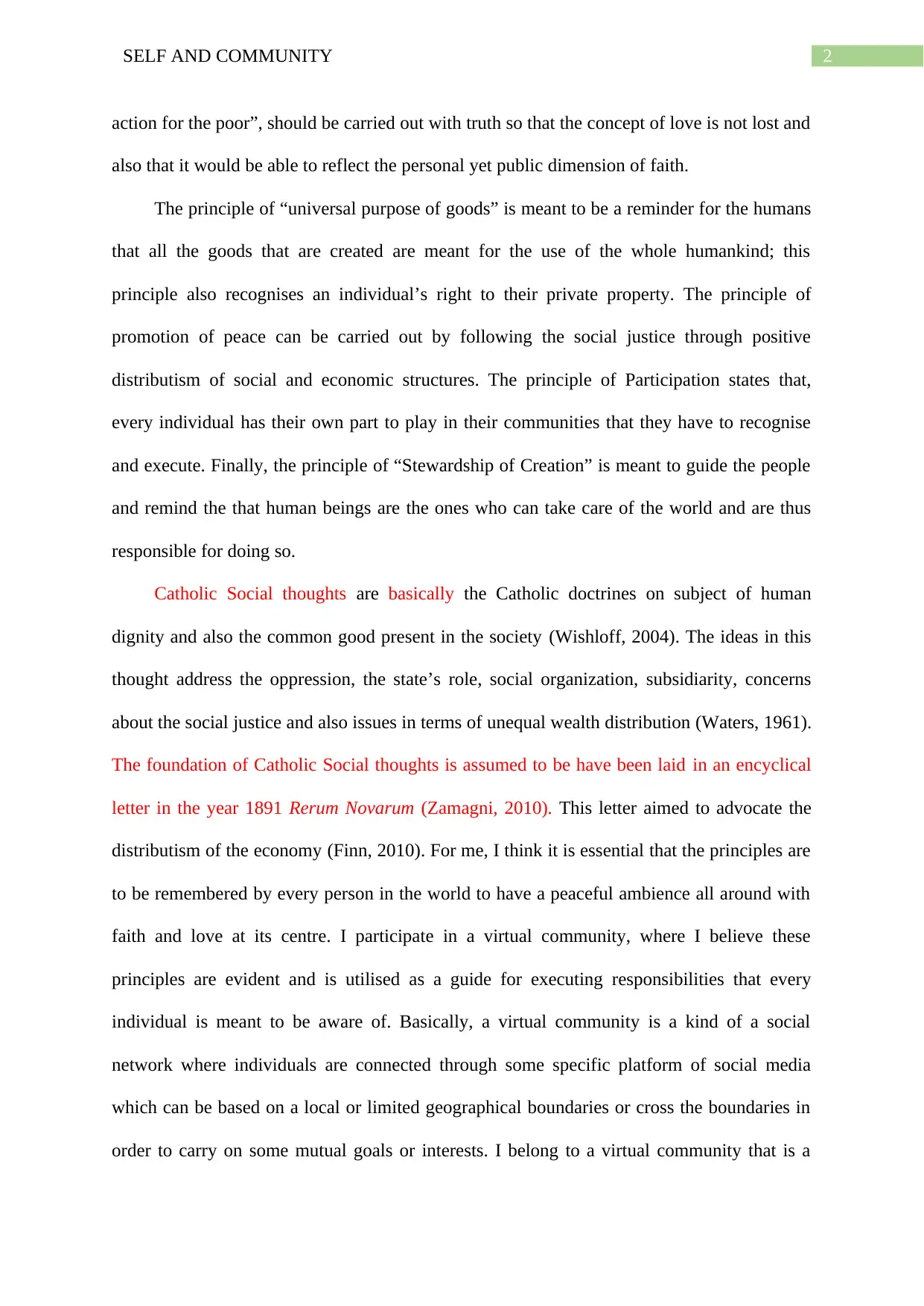
2SELF AND COMMUNITY
action for the poor”, should be carried out with truth so that the concept of love is not lost and
also that it would be able to reflect the personal yet public dimension of faith.
The principle of “universal purpose of goods” is meant to be a reminder for the humans
that all the goods that are created are meant for the use of the whole humankind; this
principle also recognises an individual’s right to their private property. The principle of
promotion of peace can be carried out by following the social justice through positive
distributism of social and economic structures. The principle of Participation states that,
every individual has their own part to play in their communities that they have to recognise
and execute. Finally, the principle of “Stewardship of Creation” is meant to guide the people
and remind the that human beings are the ones who can take care of the world and are thus
responsible for doing so.
Catholic Social thoughts are basically the Catholic doctrines on subject of human
dignity and also the common good present in the society (Wishloff, 2004). The ideas in this
thought address the oppression, the state’s role, social organization, subsidiarity, concerns
about the social justice and also issues in terms of unequal wealth distribution (Waters, 1961).
The foundation of Catholic Social thoughts is assumed to be have been laid in an encyclical
letter in the year 1891 Rerum Novarum (Zamagni, 2010). This letter aimed to advocate the
distributism of the economy (Finn, 2010). For me, I think it is essential that the principles are
to be remembered by every person in the world to have a peaceful ambience all around with
faith and love at its centre. I participate in a virtual community, where I believe these
principles are evident and is utilised as a guide for executing responsibilities that every
individual is meant to be aware of. Basically, a virtual community is a kind of a social
network where individuals are connected through some specific platform of social media
which can be based on a local or limited geographical boundaries or cross the boundaries in
order to carry on some mutual goals or interests. I belong to a virtual community that is a
action for the poor”, should be carried out with truth so that the concept of love is not lost and
also that it would be able to reflect the personal yet public dimension of faith.
The principle of “universal purpose of goods” is meant to be a reminder for the humans
that all the goods that are created are meant for the use of the whole humankind; this
principle also recognises an individual’s right to their private property. The principle of
promotion of peace can be carried out by following the social justice through positive
distributism of social and economic structures. The principle of Participation states that,
every individual has their own part to play in their communities that they have to recognise
and execute. Finally, the principle of “Stewardship of Creation” is meant to guide the people
and remind the that human beings are the ones who can take care of the world and are thus
responsible for doing so.
Catholic Social thoughts are basically the Catholic doctrines on subject of human
dignity and also the common good present in the society (Wishloff, 2004). The ideas in this
thought address the oppression, the state’s role, social organization, subsidiarity, concerns
about the social justice and also issues in terms of unequal wealth distribution (Waters, 1961).
The foundation of Catholic Social thoughts is assumed to be have been laid in an encyclical
letter in the year 1891 Rerum Novarum (Zamagni, 2010). This letter aimed to advocate the
distributism of the economy (Finn, 2010). For me, I think it is essential that the principles are
to be remembered by every person in the world to have a peaceful ambience all around with
faith and love at its centre. I participate in a virtual community, where I believe these
principles are evident and is utilised as a guide for executing responsibilities that every
individual is meant to be aware of. Basically, a virtual community is a kind of a social
network where individuals are connected through some specific platform of social media
which can be based on a local or limited geographical boundaries or cross the boundaries in
order to carry on some mutual goals or interests. I belong to a virtual community that is a
⊘ This is a preview!⊘
Do you want full access?
Subscribe today to unlock all pages.

Trusted by 1+ million students worldwide
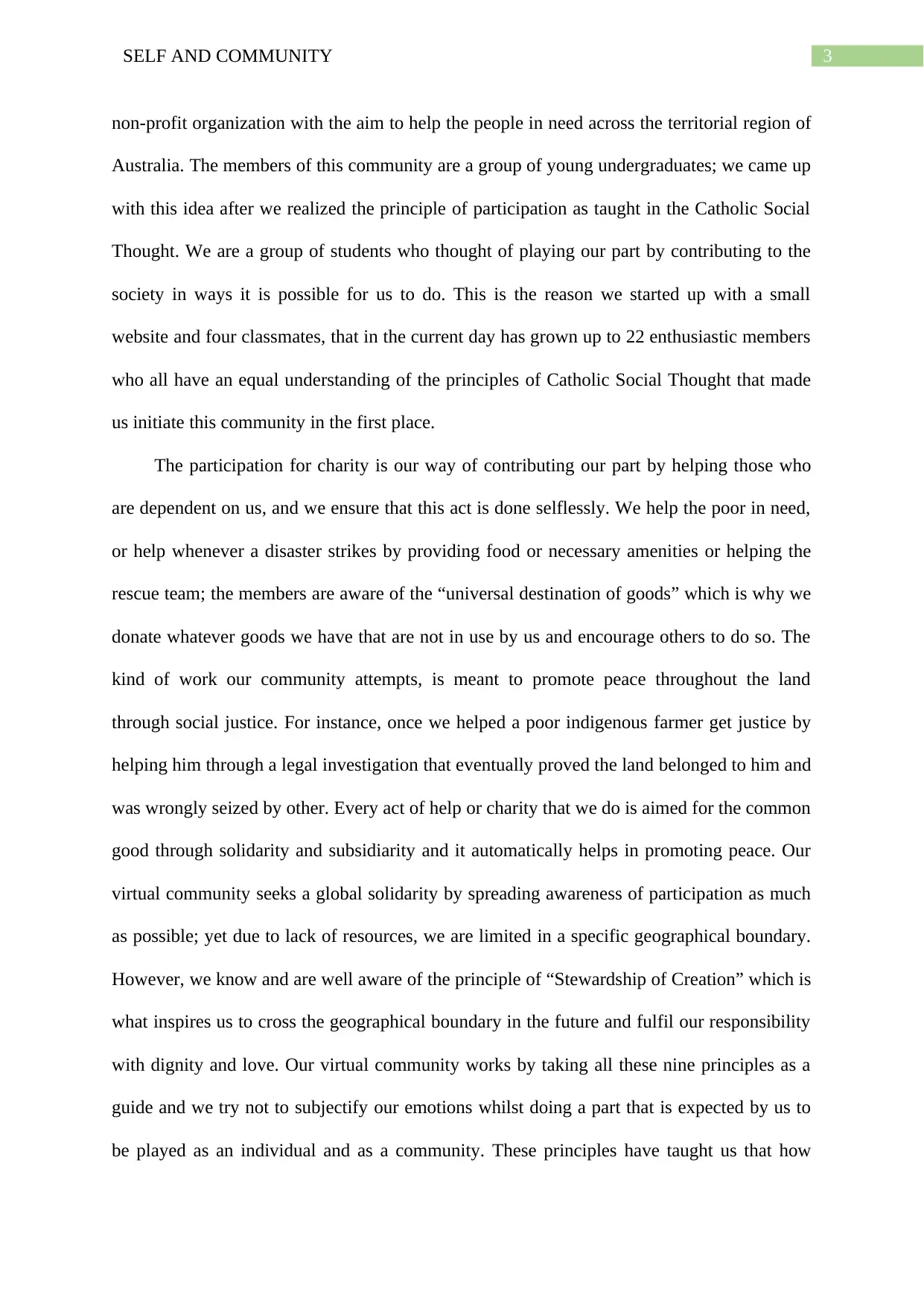
3SELF AND COMMUNITY
non-profit organization with the aim to help the people in need across the territorial region of
Australia. The members of this community are a group of young undergraduates; we came up
with this idea after we realized the principle of participation as taught in the Catholic Social
Thought. We are a group of students who thought of playing our part by contributing to the
society in ways it is possible for us to do. This is the reason we started up with a small
website and four classmates, that in the current day has grown up to 22 enthusiastic members
who all have an equal understanding of the principles of Catholic Social Thought that made
us initiate this community in the first place.
The participation for charity is our way of contributing our part by helping those who
are dependent on us, and we ensure that this act is done selflessly. We help the poor in need,
or help whenever a disaster strikes by providing food or necessary amenities or helping the
rescue team; the members are aware of the “universal destination of goods” which is why we
donate whatever goods we have that are not in use by us and encourage others to do so. The
kind of work our community attempts, is meant to promote peace throughout the land
through social justice. For instance, once we helped a poor indigenous farmer get justice by
helping him through a legal investigation that eventually proved the land belonged to him and
was wrongly seized by other. Every act of help or charity that we do is aimed for the common
good through solidarity and subsidiarity and it automatically helps in promoting peace. Our
virtual community seeks a global solidarity by spreading awareness of participation as much
as possible; yet due to lack of resources, we are limited in a specific geographical boundary.
However, we know and are well aware of the principle of “Stewardship of Creation” which is
what inspires us to cross the geographical boundary in the future and fulfil our responsibility
with dignity and love. Our virtual community works by taking all these nine principles as a
guide and we try not to subjectify our emotions whilst doing a part that is expected by us to
be played as an individual and as a community. These principles have taught us that how
non-profit organization with the aim to help the people in need across the territorial region of
Australia. The members of this community are a group of young undergraduates; we came up
with this idea after we realized the principle of participation as taught in the Catholic Social
Thought. We are a group of students who thought of playing our part by contributing to the
society in ways it is possible for us to do. This is the reason we started up with a small
website and four classmates, that in the current day has grown up to 22 enthusiastic members
who all have an equal understanding of the principles of Catholic Social Thought that made
us initiate this community in the first place.
The participation for charity is our way of contributing our part by helping those who
are dependent on us, and we ensure that this act is done selflessly. We help the poor in need,
or help whenever a disaster strikes by providing food or necessary amenities or helping the
rescue team; the members are aware of the “universal destination of goods” which is why we
donate whatever goods we have that are not in use by us and encourage others to do so. The
kind of work our community attempts, is meant to promote peace throughout the land
through social justice. For instance, once we helped a poor indigenous farmer get justice by
helping him through a legal investigation that eventually proved the land belonged to him and
was wrongly seized by other. Every act of help or charity that we do is aimed for the common
good through solidarity and subsidiarity and it automatically helps in promoting peace. Our
virtual community seeks a global solidarity by spreading awareness of participation as much
as possible; yet due to lack of resources, we are limited in a specific geographical boundary.
However, we know and are well aware of the principle of “Stewardship of Creation” which is
what inspires us to cross the geographical boundary in the future and fulfil our responsibility
with dignity and love. Our virtual community works by taking all these nine principles as a
guide and we try not to subjectify our emotions whilst doing a part that is expected by us to
be played as an individual and as a community. These principles have taught us that how
Paraphrase This Document
Need a fresh take? Get an instant paraphrase of this document with our AI Paraphraser

4SELF AND COMMUNITY
human beings are interdependent on each other and it is an honour that has only been given to
the humans to have that capability to take care of all other creatures in the planet (Hornsby-
Smith, 2006). Our virtual community understands this responsibility and also tries to make
other people understand the same, who misuse such power and make others lose faith in
humanity. Principles of Catholic Social Thought provides guidance to every individual, that I
believe should be taken into consideration; it would promote peace and harmony.
human beings are interdependent on each other and it is an honour that has only been given to
the humans to have that capability to take care of all other creatures in the planet (Hornsby-
Smith, 2006). Our virtual community understands this responsibility and also tries to make
other people understand the same, who misuse such power and make others lose faith in
humanity. Principles of Catholic Social Thought provides guidance to every individual, that I
believe should be taken into consideration; it would promote peace and harmony.
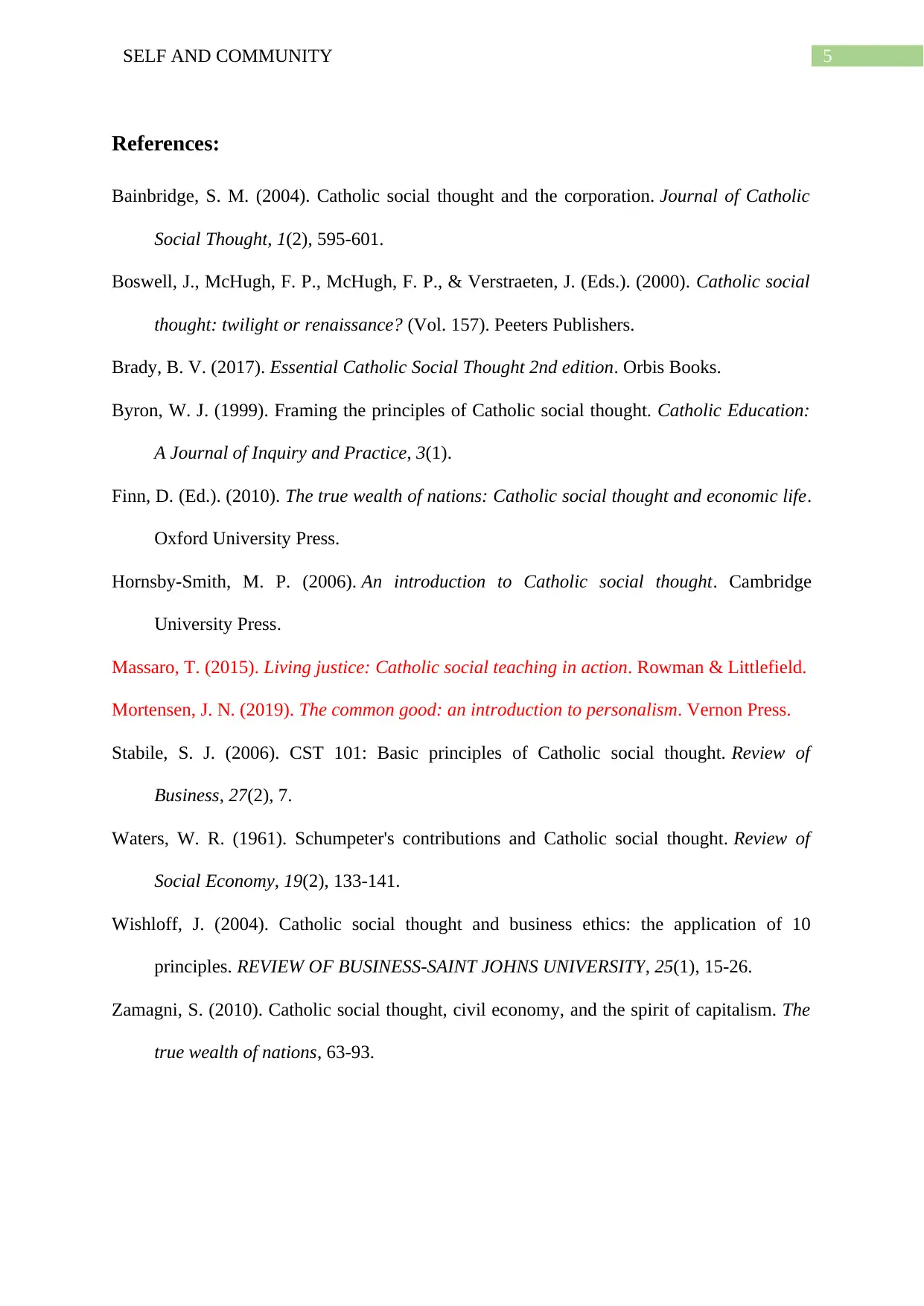
5SELF AND COMMUNITY
References:
Bainbridge, S. M. (2004). Catholic social thought and the corporation. Journal of Catholic
Social Thought, 1(2), 595-601.
Boswell, J., McHugh, F. P., McHugh, F. P., & Verstraeten, J. (Eds.). (2000). Catholic social
thought: twilight or renaissance? (Vol. 157). Peeters Publishers.
Brady, B. V. (2017). Essential Catholic Social Thought 2nd edition. Orbis Books.
Byron, W. J. (1999). Framing the principles of Catholic social thought. Catholic Education:
A Journal of Inquiry and Practice, 3(1).
Finn, D. (Ed.). (2010). The true wealth of nations: Catholic social thought and economic life.
Oxford University Press.
Hornsby-Smith, M. P. (2006). An introduction to Catholic social thought. Cambridge
University Press.
Massaro, T. (2015). Living justice: Catholic social teaching in action. Rowman & Littlefield.
Mortensen, J. N. (2019). The common good: an introduction to personalism. Vernon Press.
Stabile, S. J. (2006). CST 101: Basic principles of Catholic social thought. Review of
Business, 27(2), 7.
Waters, W. R. (1961). Schumpeter's contributions and Catholic social thought. Review of
Social Economy, 19(2), 133-141.
Wishloff, J. (2004). Catholic social thought and business ethics: the application of 10
principles. REVIEW OF BUSINESS-SAINT JOHNS UNIVERSITY, 25(1), 15-26.
Zamagni, S. (2010). Catholic social thought, civil economy, and the spirit of capitalism. The
true wealth of nations, 63-93.
References:
Bainbridge, S. M. (2004). Catholic social thought and the corporation. Journal of Catholic
Social Thought, 1(2), 595-601.
Boswell, J., McHugh, F. P., McHugh, F. P., & Verstraeten, J. (Eds.). (2000). Catholic social
thought: twilight or renaissance? (Vol. 157). Peeters Publishers.
Brady, B. V. (2017). Essential Catholic Social Thought 2nd edition. Orbis Books.
Byron, W. J. (1999). Framing the principles of Catholic social thought. Catholic Education:
A Journal of Inquiry and Practice, 3(1).
Finn, D. (Ed.). (2010). The true wealth of nations: Catholic social thought and economic life.
Oxford University Press.
Hornsby-Smith, M. P. (2006). An introduction to Catholic social thought. Cambridge
University Press.
Massaro, T. (2015). Living justice: Catholic social teaching in action. Rowman & Littlefield.
Mortensen, J. N. (2019). The common good: an introduction to personalism. Vernon Press.
Stabile, S. J. (2006). CST 101: Basic principles of Catholic social thought. Review of
Business, 27(2), 7.
Waters, W. R. (1961). Schumpeter's contributions and Catholic social thought. Review of
Social Economy, 19(2), 133-141.
Wishloff, J. (2004). Catholic social thought and business ethics: the application of 10
principles. REVIEW OF BUSINESS-SAINT JOHNS UNIVERSITY, 25(1), 15-26.
Zamagni, S. (2010). Catholic social thought, civil economy, and the spirit of capitalism. The
true wealth of nations, 63-93.
⊘ This is a preview!⊘
Do you want full access?
Subscribe today to unlock all pages.

Trusted by 1+ million students worldwide
1 out of 6
Related Documents
Your All-in-One AI-Powered Toolkit for Academic Success.
+13062052269
info@desklib.com
Available 24*7 on WhatsApp / Email
![[object Object]](/_next/static/media/star-bottom.7253800d.svg)
Unlock your academic potential
Copyright © 2020–2026 A2Z Services. All Rights Reserved. Developed and managed by ZUCOL.



